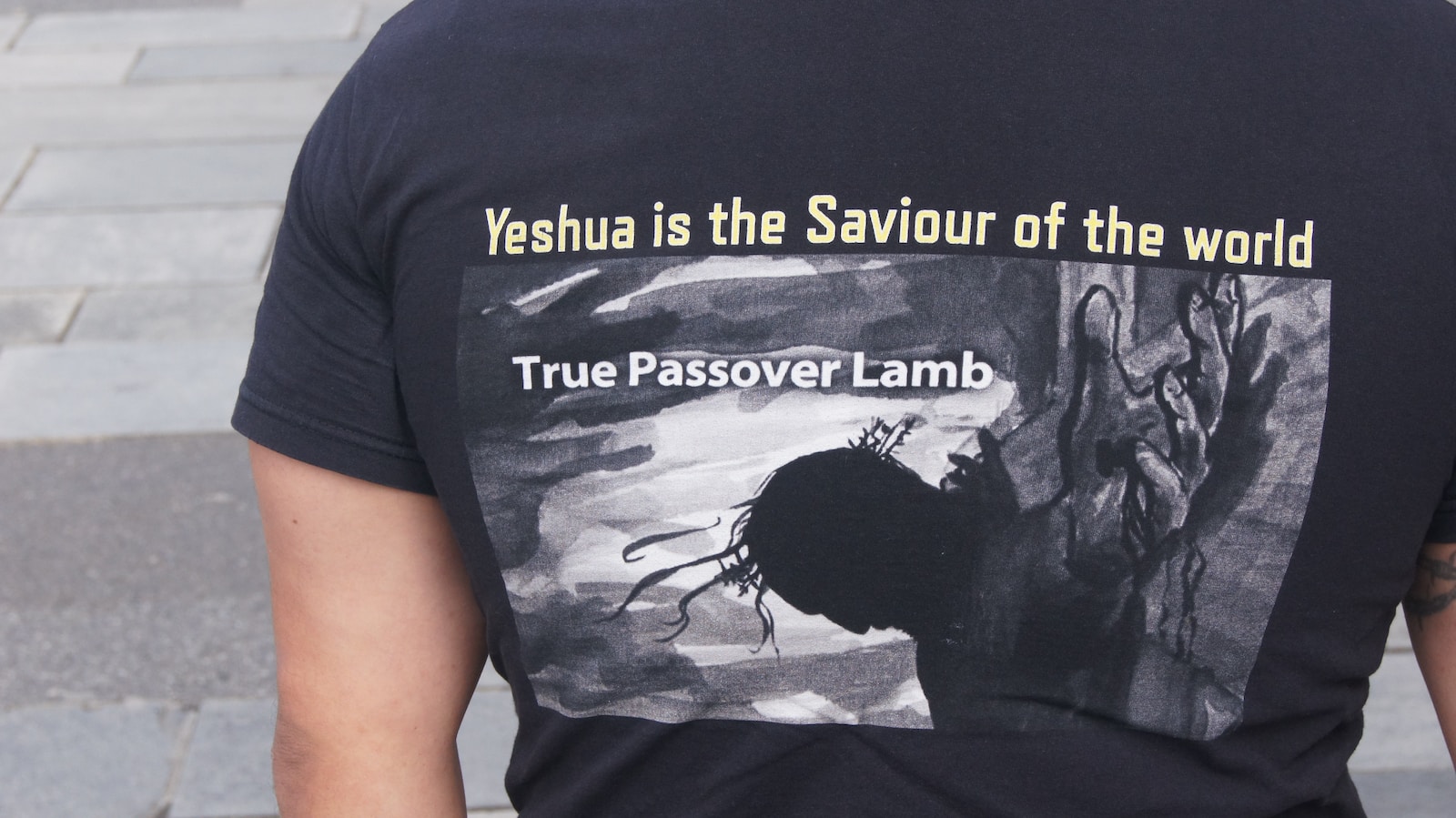Introduction: The Significance of Leviticus 8 and its Connection to Jesus
Leviticus 8 holds a crucial place in the book of Leviticus, as it marks the consecration of Aaron and his sons as the priests of Israel. This chapter is filled with profound symbolism and foreshadowing, pointing to Jesus as the ultimate High Priest. The anointing and consecration of the priests in Leviticus 8 foreshadows Jesus’ anointing as the Messiah, emphasizing his role in mediating between God and humanity.
In Leviticus 8, God instructs Moses to gather Aaron and his sons at the entrance of the tent of meeting. This gathering signifies a sacred moment, as Aaron and his sons are set apart and consecrated to serve as mediators between God and the people of Israel. The anointing oil used in their consecration is a symbol of the Holy Spirit and divine appointment. This anointing is reminiscent of Jesus’ own anointing by the Holy Spirit at the beginning of his ministry, symbolizing his divine appointment as the Messiah and High Priest.
Furthermore, the consecration rituals in Leviticus 8 involve the sprinkling of blood on Aaron and his sons, representing the atonement for sin. This foreshadows Jesus’ sacrificial death on the cross, where his blood was shed as the ultimate atonement for the sins of humanity. Leviticus 8 establishes a pattern of blood sacrifice and purification that finds its fulfillment in Jesus’ redemptive work.
The significance of Leviticus 8 lies in its foreshadowing of Jesus as the ultimate High Priest and the perfect sacrifice for the forgiveness of sins. This chapter sets the stage for understanding the continuity and fulfillment found in Jesus’ life and ministry. By exploring the symbolism and foreshadowing in Leviticus 8, we gain a deeper understanding of Jesus’ role as the Messiah and the ultimate fulfillment of God’s plan for redemption.
Messianic Prophecies in the Old Testament
The Old Testament is replete with Messianic prophecies, which are promises and predictions about the coming of the Messiah. These prophecies serve as a roadmap, guiding the Jewish people and later Christians in recognizing the fulfillment of God’s plan through Jesus.
One of the earliest Messianic prophecies is found in Genesis 3:15, where God promises that the seed of the woman will crush the head of the serpent. This prophecy points to Jesus as the ultimate victor over sin and death. Throughout the Old Testament, there are prophecies that speak of a future king from the line of David who will establish an eternal kingdom (2 Samuel 7:12-16). These prophecies find their fulfillment in Jesus, who is descended from the lineage of David and establishes the Kingdom of God.
Other Messianic prophecies highlight specific details about the Messiah’s life and ministry. For example, Isaiah 53 foretells of a suffering servant who will bear the sins of the people. This prophecy finds its fulfillment in Jesus’ sacrificial death on the cross. The book of Micah prophesies that the Messiah will be born in Bethlehem, which is precisely where Jesus was born. These prophecies, among many others, provide a framework for understanding and recognizing Jesus as the fulfillment of God’s plan.
The Messianic prophecies in the Old Testament serve as signposts, guiding people to recognize Jesus as the promised Messiah. They provide specific details about the Messiah’s lineage, birthplace, ministry, and even his suffering and death. The fulfillment of these prophecies in Jesus validates his identity as the long-awaited Messiah and solidifies his role as the Savior of humanity.
Fulfillment of Prophecy in Jesus
Jesus’ life and ministry are marked by the fulfillment of numerous Messianic prophecies, confirming his identity as the long-awaited Messiah. He fulfills prophecies related to his lineage, birthplace, ministry, and even his suffering and death. The Gospel accounts of Matthew, Mark, Luke, and John meticulously highlight Jesus’ fulfillment of Messianic prophecies, drawing connections between the events of Jesus’ life and the prophecies spoken centuries before his birth.
For example, Matthew’s Gospel regularly cites Old Testament prophecies and shows how Jesus fulfills them. In Matthew 1:22-23, it is stated that Jesus’ birth in Bethlehem fulfills the prophecy of Micah 5:2. Matthew 2:15 quotes the prophecy of Hosea 11:1, which speaks of Jesus’ escape to Egypt as a child. These examples demonstrate how Jesus’ life and actions align with the Messianic prophecies, validating his identity as the long-awaited Messiah.
Jesus’ fulfillment of prophecy extends beyond his birth and early life. It encompasses his ministry, teachings, miracles, and even his suffering and death. For instance, Jesus’ entry into Jerusalem riding on a donkey fulfills the prophecy of Zechariah 9:9. His betrayal by Judas Iscariot and subsequent crucifixion align with the prophecies of Psalm 41:9 and Isaiah 53:12.
The fulfillment of Messianic prophecies in Jesus is a testament to God’s faithfulness and sovereignty. It demonstrates that God’s plan for the redemption of humanity was set in motion long before Jesus’ birth. The fulfillment of these prophecies in Jesus attests to the divine orchestration of history and the meticulous attention to detail in God’s plan.
Symbolism and Foreshadowing in Leviticus
Leviticus is replete with symbolism, providing a foreshadowing of Jesus’ ministry and sacrifice. The rituals and ceremonies described in Leviticus 8, such as the anointing with oil and the sprinkling of blood, symbolize purification and consecration. These rituals foreshadow Jesus’ role as the ultimate High Priest and the perfect sacrifice for the forgiveness of sins.
The anointing with oil in Leviticus 8 represents the Holy Spirit’s presence and empowerment. Similarly, Jesus’ anointing with the Holy Spirit at the beginning of his ministry symbolizes his divine appointment and authority. Just as the priests in Leviticus were anointed with oil, setting them apart for their priestly duties, Jesus’ anointing with the Holy Spirit signifies his divine appointment as the Messiah and High Priest.
The sprinkling of blood in Leviticus 8 signifies the atonement for sin, foreshadowing Jesus’ sacrificial death on the cross. Just as the priests were purified and consecrated through the sprinkling of blood, Jesus’ blood serves as the ultimate and perfect atonement for the sins of humanity. The sacrificial system in Leviticus, with its emphasis on blood sacrifice and purification, establishes a pattern that finds its fulfillment in Jesus’ redemptive work.
The concept of sacrifice is central in Leviticus, and it points to Jesus as the ultimate sacrifice for sin. The animal sacrifices in Leviticus serve as temporary substitutes, providing a temporary covering for sin. However, Jesus’ sacrifice on the cross is the perfect and complete atonement for all sin, making any further sacrifices unnecessary. Leviticus 8 sets the stage for understanding the significance of Jesus’ sacrifice and underscores the continuity between the Old Testament sacrificial system and the ultimate sacrifice of Christ.
Jesus as the Ultimate High Priest
Jesus embodies the role of the ultimate High Priest, surpassing the Levitical priesthood in every aspect. His anointing with the Holy Spirit signifies his divine appointment and authority as the mediator between God and humanity. Jesus’ ministry of forgiving sins and his sacrificial death on the cross fulfill the priestly role of atoning for the sins of the people.
The book of Hebrews extensively explores Jesus’ role as the High Priest. It emphasizes that Jesus is superior to the Levitical priests because he is sinless and has offered himself as the perfect sacrifice. Unlike the Levitical priests who offered sacrifices for their own sins, Jesus’ sacrifice was once and for all, providing eternal redemption for all who believe in him.
Furthermore, Jesus’ priesthood is not limited to a specific lineage or time period. He is a priest forever in the order of Melchizedek, an enigmatic figure mentioned in the book of Genesis. The author of Hebrews draws parallels between Melchizedek and Jesus, highlighting their shared characteristics and emphasizing Jesus’ eternal priesthood.
Jesus’ role as the ultimate High Priest is a testament to his divine nature and his ability to mediate between God and humanity. His sinlessness and perfect sacrifice make him the ideal High Priest, able to intercede on behalf of humanity and offer eternal redemption.
Jesus as the Messiah
Jesus fulfills the prophetic, priestly, and kingly roles attributed to the Messiah in the Old Testament. As the prophetic Messiah, he taught about the coming of the Kingdom of God and fulfilled the prophecies related to his ministry and identity. Jesus’ anointing with the Holy Spirit aligns with the priestly anointing, and his lineage from the royal line of King David fulfills the kingly role.
Throughout his ministry, Jesus proclaimed the good news of the Kingdom of God, teaching about God’s reign and inviting people to repent and believe in him. He fulfilled numerous prophecies concerning his ministry, including healing the sick, casting out demons, and raising the dead. Jesus’ teachings and actions align with the Messianic expectations found in the Old Testament, affirming his identity as the prophetic Messiah.
Additionally, Jesus’ genealogy traces back to King David, fulfilling the Messianic prophecies that speak of a future king from the line of David. The Gospel of Matthew begins with Jesus’ genealogy, highlighting his royal lineage and establishing his qualification as the Messiah. Jesus’ fulfillment of the prophetic, priestly, and kingly roles solidifies his identity as the long-awaited Messiah.
Jesus’ identity as the Messiah has significant implications for the Christian faith. It affirms that Jesus is the promised Savior and Redeemer, bringing hope and salvation to all who believe in him. Understanding Jesus’ fulfillment of Messianic prophecies deepens our faith and trust in him as the one who fulfills God’s plan for redemption.
The Significance of Leviticus 8 in the Context of the Old Testament
Leviticus 8 serves as a crucial chapter in the broader context of Leviticus and the Old Testament. It establishes the foundation for the Levitical priesthood and the sacrificial system, which find their ultimate fulfillment in Jesus. Leviticus 8 showcases God’s design for worship and the need for a perfect High Priest who can offer a perfect sacrifice.
In the book of Leviticus, God gives detailed instructions for the Israelites concerning worship, sacrifices, and purity. Leviticus 8 specifically focuses on the consecration of the priests, outlining the rituals and ceremonies necessary for their appointment. These instructions emphasize the holiness of God and the importance of approaching him with reverence and purity.
The Levitical priesthood and the sacrificial system were temporary measures, providing a temporary covering for sin. They served as a constant reminder of humanity’s need for a perfect High Priest and a perfect sacrifice. Leviticus 8 foreshadows the coming of Jesus, who fulfills these requirements and offers himself as the ultimate sacrifice for the forgiveness of sins.
Leviticus 8 sets the stage for understanding the significance of Jesus’ role as the ultimate High Priest and the perfect sacrifice. It highlights the need for a mediator between God and humanity, as well as the importance of atonement for sin. The rituals and symbolism in Leviticus 8 find their fulfillment in Jesus’ life and ministry, revealing God’s plan for redemption and reconciliation with humanity.
The Connection between Leviticus 8 and Jesus
The events and symbols in Leviticus 8 find their fulfillment in Jesus’ life and ministry. The anointing of the priests in Leviticus 8 foreshadows Jesus’ anointing as the Messiah, emphasizing his divine appointment. Jesus’ role as the ultimate High Priest is prefigured in the Levitical priesthood, highlighting the continuity and fulfillment found in him.
The anointing with oil in Leviticus 8 symbolizes the descent of the Holy Spirit upon the priests, marking their consecration and divine appointment. This anointing parallels Jesus’ own anointing with the Holy Spirit at the beginning of his ministry, signifying his divine appointment as the Messiah and High Priest.
The sprinkling of blood in Leviticus 8 represents the atonement for sin, pointing to Jesus’ sacrificial death on the cross. Just as the priests were purified and consecrated through the sprinkling of blood, Jesus’ blood serves as the ultimate and perfect atonement for the sins of humanity.
The connection between Leviticus 8 and Jesus underscores the continuity and fulfillment found in the person and work of Christ. Leviticus 8 sets the stage for understanding Jesus’ role as the ultimate High Priest and the perfect sacrifice, demonstrating God’s plan for redemption and reconciliation with humanity.
The Role of Messianic Prophecies in Establishing Jesus’ Identity
Messianic prophecies play a crucial role in establishing Jesus’ identity as the long-awaited Messiah. They provide a clear framework for recognizing Jesus as the fulfillment of God’s promises and plans. The fulfillment of Messianic prophecies validates Jesus’ claims to be the Messiah and solidifies his role as the Savior of humanity.
The Messianic prophecies found in the Old Testament serve as signposts, pointing to the coming of the Messiah and providing specific details about his identity and mission. These prophecies create a coherent picture of the Messiah’s characteristics and actions, enabling people to recognize Jesus as the fulfillment of these prophecies.
Jesus himself appealed to the Messianic prophecies to establish his identity. For example, in Luke 4:16-21, Jesus reads from the book of Isaiah, proclaiming that the prophecy has been fulfilled in him. He declares that he is the Messiah, sent to bring good news to the poor, proclaim freedom for the prisoners, and set the oppressed free.
The role of Messianic prophecies in establishing Jesus’ identity extends beyond his earthly ministry. The prophecies also encompass his death, resurrection, and future return. Understanding the fulfillment of Messianic prophecies in Jesus deepens our faith and trust in him as the promised Messiah.
The fulfillment of Messianic prophecies in Jesus validates his identity as the long-awaited Messiah. These prophecies provide a clear framework for recognizing Jesus as the fulfillment of God’s promises and plans. They establish Jesus’ identity as the promised Savior and Redeemer, bringing hope and salvation to all who believe in him.
The Impact of Jesus’ Fulfillment of Prophecy
Jesus’ fulfillment of Messianic prophecies has profound implications for Christian faith and theology. It confirms that Jesus is the promised Messiah, bringing hope and salvation to all who believe in him. Jesus’ fulfillment of prophecy reveals the divine plan of redemption and the extent of God’s love for humanity.
The fulfillment of Messianic prophecies in Jesus validates the credibility and reliability of Scripture. The accuracy of these prophecies, spoken centuries before Jesus’ birth, demonstrates the divine inspiration behind the Old Testament writings. This fulfillment strengthens the faith of believers and provides a solid foundation for Christian theology.
Furthermore, Jesus’ fulfillment of prophecy assures us of God’s faithfulness and love. It shows that God kept his promises and acted in accordance with his plan for salvation. Jesus’ fulfillment of Messianic prophecies reveals the depth of God’s love for humanity, as he sent his Son to fulfill his purposes and bring about reconciliation with humanity.
The impact of Jesus’ fulfillment of prophecy extends to the present and the future. It offers hope and assurance to believers that God’s promises will be fulfilled. Just as Jesus fulfilled the prophecies of his first coming, we can trust that he will fulfill the prophecies concerning his second coming and the establishment of his eternal kingdom.
In conclusion, the fulfillment of Messianic prophecies in Jesus validates his identity as the long-awaited Messiah. Leviticus 8 and the Messianic prophecies found throughout the Old Testament point to Jesus as the fulfillment of God’s promises and plans. Understanding the symbolism and foreshadowing in Leviticus 8 deepens our appreciation for Jesus as the ultimate Savior and Redeemer. His fulfillment of prophecy confirms his role as the ultimate High Priest, the perfect sacrifice for the forgiveness of sins, and the fulfillment of God’s plan for redemption and reconciliation with humanity.
#OldTestament #BiblicalInterpretation #DivineAppointment #PriestlyAnointing #HolySpirit #Atonement #RedemptivePlan #ChristianFaith #BiblicalSymbolism #PropheticFulfillment #DivinePromise #DivineLove #God’sFaithfulness #ChristianTheology #HopeInJesus #MessiahRevealed #ReligiousStudy #FaithInChrist #BiblicalTeachings #ScripturalUnderstanding


